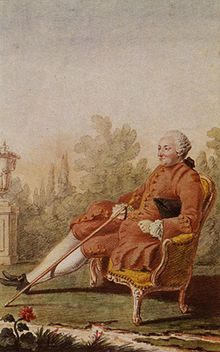Christianity Unveiled
The assertions presented find numerous parallels in Holbach's later works, yet contain only latent atheistic statements and primarily attack Christianity in contrast to religion in general.
[9] The very similar thematic relationships to Holbach's verified works, which go as far as verbatim matches, confirm his authorship and rule out Boulanger, Voltaire, and Damilaville as authors from a stylistic and content perspective.
Following the introduction on the necessity of subjecting religion to critical examination, the first two chapters provide an overview of the history of Judaism and Christianity.
From the standpoint of theoretical philosophy, Holbach criticizes the flawed terminology of Christian faith regarding the alleged properties of God and also presents language philosophical and epistemological considerations.
Holbach counters that it is not religion, but laws that restrain the people, and thus questions the critic whether he belongs to those "faint-hearted thinkers" who "believe that truth can be harmful".
Individuals, whether poor or rich, cling to faith only because they have been raised and educated that way from childhood; in this way, religious views have been able to persist for centuries: Since the Christian religion attributes a role model function to its god, described as cruel and malicious, it has only brought hatred, discord, and violence to the people.
The history of the Jewish and Christian religion is briefly and dryly described by the author; the goal pursued by Fontenelle (De l’origine des fables) and Boulanger (L’antiquité dévoilée) of revealing the human-psychological causes of religious beliefs is only marginally of interest to him.
[22] Holbach portrays the origin of the "Jewish people" – "in a small area, hardly noticed by other nations" – as distinctly mundane and insignificant, to deny it any credibility.
Moses turned the Hebrews into "possessed and wild monsters" who hated other gods and, as reported in the 1st Book of Kings, acted barbarically against other nations.
Holbach emphasizes the Egyptian, Phoenician, Platonic and other influences of the new "crude and disjointed" religion – a theme that is repeatedly addressed in the following chapters.
The contrast between the charity preached by Christians and their fanatical cruelty is explained by the adoption of the Jewish god, whose terrible nature was further intensified by the concept of eternal damnation.
Holbach tries to distinguish between facts and religious myths; only after the historically oriented presentation of the previous chapters does the work deal with the revelation.
The same applies to the Transubstantiation (transformation of bread and wine into the body and blood of Jesus Christ), Confession, Prayer, and Exorcism: "all mystery, all magic, all incomprehensible."
Contrary to the biblical exegesis of some modern theologians, who interpret certain passages of scripture symbolically, Holbach took the statements of the Bible literally.
Given such a book, it is not surprising that Christians have repeatedly argued over what their God wants from them: Holbach rejects the notion that morality is impossible without supernatural revelation.
Thinkers of pre-Christian societies – Socrates, Confucius, or the Gymnosophists – were in no way inferior to Jesus Christ and refuted the Christian monopoly claim on values such as justice, patriotism, patience, or gentleness.
Blinded by the Hope of eternal life, believers lose sight of present happiness; the Catholic virtue of Modesty degrades humans and robs them of their drive for action.
Even if Christianity prevents some people from committing crimes – which is doubted – these benefits are nothing compared to the immense damage this religion has caused.
[30] The peddler Lefèvre, who in 1768 owned copies of Le christianisme dévoilé among a whole series of philosophical new releases, was arrested and convicted multiple times.
[31] In October 1768, the police arrested the sales assistant Josserand, the peddler Lecuyer and his wife for selling books "contrary to good morals and religion," including Le christianisme dévoilé.
[39] In contrast, five new editions alone appeared in 1767, which, together with the high price of the book – according to Diderot up to four Louis per copy[40] – testify to its success with the French public.
He not only congratulates the author but also expresses his appreciation: A few weeks later, Diderot reports in a letter to Voltaire about a newly published book, which is probably Le christianisme dévoilé.
They leave no doubt that he was disturbed by the appearance of the work, anticipating his rejection of Holbach's explicitly atheistic Système de la nature.
[47] The German diplomat and writer Friedrich Melchior Grimm, a long-time participant in the philosophical dinners organized at Holbach's house, described in his review Le christianisme dévoilé as the "boldest and most terrifying book ever to appear anywhere in the world".
[49] Johann Christoph von Zabuesnig commented on the book as follows: The theologian Nicolas-Sylvestre Bergier published in 1769 as a response to Holbach's work the two-volume Apologie de la religion chrétienne, contre l’auteur du Christianisme dévoilé et contre quelques autres critiques, which is held in the traditional style of Catholic Apologetics.
[53] By attacking religious tyranny in Le christianisme dévoilé, the author is preparing the way for that of secular laws, for without religion, these would necessarily have to be much stricter.
For example, Holbach errs when he says that the Christian God foresees hellish torments for the majority of people: Another slander is the claim that eternal life is reserved for only a small number of the chosen, for according to the holy books, heavenly happiness is a reward for good deeds, especially charity.
When considering the Theodicy issue, Bergier partly relies on Pierre Bayle's statement that an "infinite expanse" separates God's actions from those of men.
[63] In 2009, Wulf Kellerwessel published a detailed examination of the work's statements in the journal Enlightenment and Critique, assessing the strength of Holbach's arguments as very uneven.
[65] Kellerwessel summarizes his impressions as follows: Holbach's timeless claim to expose religious beliefs as prejudices makes the text "still readable and interesting today.


